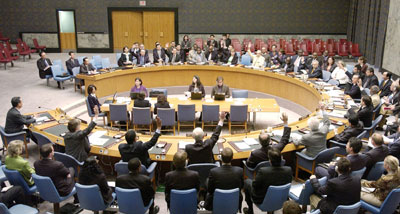Text of the UN
resolution
China: UN move should help
peacefully solve nuclear issue
UNITED NATIONS -- The
United Nations Security Council on Saturday unanimously adopted a resolution
imposing sanctions against the Democratic People's Republic of Korea (DPRK)for
its recent nuclear test. [Full coverage on North Korea nuclear crisis]

The U.N. Security Council votes
unanimously to impose financial and weapons sanctions on North Korea for
its nuclear test, which the resolution called a "clear threat to
international peace and security," in New York, October 14, 2006.
[Reuters] |
The resolution, co-sponsored by
the United States and eight other nations, condemns the nuclear test proclaimed
by the DPRK, demands that the DPRK eliminate its nuclear weapons and nuclear
programs, and imposes sanctions on the DPRK in spheres related to its nuclear,
ballistic missiles and weapons of mass destruction.
The resolution also welcomes and encourages further efforts by all states
concerned to intensify their diplomatic efforts, refrain from any actions that
might aggravate tension and to facilitate the early resumption of the Six-Party
Talks. Watch Video
Explaining China's position after the vote, Wang
Guangya, Chinese Permanent Representative to the UN, said that China supports
the Security Council in making a firm and appropriate response, and that China
believes the act of the Security Council should both indicate the firm position
of the international community and help create enabling conditions for the final
peaceful solution to the DPRK's nuclear issues through dialogue.
But he stressed that sanction itself is not the end, noting the resolution
makes it clear that the Security Council will suspend or lift sanctions against
DPRK if it complies with the relevant requests of the resolution. He also voiced
China's reservation over the practice of inspecting cargo to and from the DPRK.
China strongly urges the countries concerned to adopt a prudent and
responsible attitude in this regard and refrain from taking any provocative
steps that may intensify the tension, he added.
Despite some negative development of DPRK's nuclear test, China's policies on
the issue remain unchanged, he said.
U.S. Ambassador John Bolton said the DPRK's nuclear test "poses one of the
gravest threats to international peace and security" and that the resolution has
sent "a strong and clear message."
Japanese UN ambassador Kenzo Oshima said the DPRK's nuclear test is
unacceptable behavior, which should be met not only with strong admonishment but
with necessary measures prescribed in Chapter 7 of the UN Charter.
Speaking after the vote, the DPRK's UN ambassador Pak Gil Yon said his
country "totally rejects" the resolution, criticizing the Council for adopting
"a coercive resolution while neglecting the nuclear threat and moves for
sanctions and pressure of the United States against DPRK."
He said the DPRK is ready for both dialogue and confrontation. "If the United
States increases pressure upon the DPRK persistently, the DPRK will continue to
take physical countermeasures, considering it as a declaration of a war," he
said.
The resolution came after intensive consultations over the past days to find
consensus on the international community's response.
Political observers here noted that the resolution has dropped the
possibility of using force and fallen short of imposing comprehensive sanctions
on the DPRK. It has also affirmed that sanction measures would be modified,
suspended or lifted if the DPRK complies with the provisions of the resolution.
Envoy: DPRK "totally rejects" UN resolution
UNITED
NATIONS -- The Democratic People's Republic of Korea (DPRK) "totally rejects" a
resolution unanimously adopted Saturday by the UN Security Council on its
nuclear test, the DPRK's UN Ambassador Pak Gil Yon said Saturday.
Addressing the council members after the resolution was adopted, Pak
criticized the council of adopting "a coercive resolution while neglecting the
nuclear threat and moves for sanctions and pressure of the United States against
the DPRK."
"The DPRK is ready for both dialogue and confrontation," Pak said. "If the
United States increases pressure upon the DPRK persistently, the DPRK will
continue to take physical countermeasures, considering it as a declaration of a
war."
He said the DPRK's nuclear test was entirely attributable to the U.S. nuclear
threat, sanctions and pressure.
Pak said that "the DPRK has exerted every possible effort to settle the
nuclear issue through dialogue and negotiations, prompted by its sincere desire
to realize the denuclearization of the Korean Peninsula."
He accused Washington of responding "to the DPRK's patient and sincere
efforts and magnanimity with the policy of sanctions and blockade."
Pak said his country "was compelled to substantially prove its possession of
nukes to protect its sovereignty and right to existence from the daily
increasing danger of war from the United States."
The denuclearization of the entire peninsula is an ultimate goal of the DPRK,
he added.
The DPRK would "abandon nukes" when it is no longer exposed to the U.S.
threat after it has dropped its hostile policy and confidence has been built
between the two countries, Pak said.